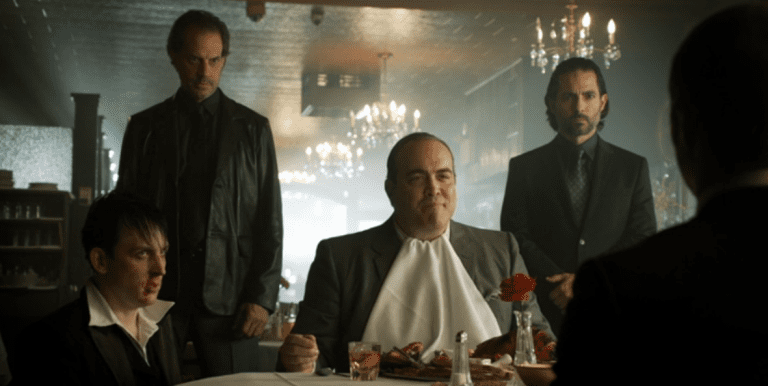Gotham, the Batman prequel on Fox, seems to me to be finding its legs. The early episodes featured a bit too much of what many series offer early on — heavy doses of exposition and unsubtly explicit attempts to Establish Characters. The tone has also been inconsistent, giving one the sense that this is an 8 o’clock network show that partly wishes it were on at 10 pm on FX.
The fan service bits have been fun — hey, look, it’s a young Poison Ivy! — but the show is going to need more than that to keep us interested. It’s also been fun, all along, watching some terrific pros at work. Donal Logue is perfect as the pragmatically corrupt Det. Harvey Bullock. Jada Pinkett Smith is having contagiously campy fun with her role as the gangster Fish Mooney. And Sean Pertwee is making me care about Alfred Pennyworth’s role in this story (while also reminding me, in a good way, of his Doctor dad).
But the core of the show is Det. Jim Gordon, and it’s here, with Ben McKenzie, that Gotham has really started to hook me in. Playing an unfailingly good and honest man is a tricky thing. It can flatten a character out into little more than a cipher or a variable. But McKenzie keeps Gordon alive and interesting by playing him as a man who repeatedly chooses to be good and honest — often because he doesn’t seem to know what else to do.
That’s especially true in his scenes with the terrific Robin Lord Taylor, who seems to be waddling off with the show. Gotham was never supposed to be “Young Batman,” but thanks to Taylor it’s not just “Young Jim Gordon” either. Increasingly, it’s “Young Penguin,” and that turns out to be far more interesting than I would have expected.
There was a scene in the fifth episode that, for me, captured what’s potentially most interesting in this series. Gordon has been dragged before the mobster Maroni to tell the story in which he refused to kill Oswald Cobblepot (the Penguin). Cobblepot is sitting there at the table and if their stories don’t match, Maroni will kill them both.
“Jim, just tell the truth,” Penguin hisses to Gordon, and both actors show us the steps involved in their thinking. Gordon knows that Cobblepot is an untrustworthy liar who might have said anything, but he also knows that the Penguin is smart enough to guess that Gordon will tell the truth, as he usually does. Cobblepot is probably counting on Gordon to be trustworthy and honest, so the safest answer would be to tell the truth. But Gordon can also see that Cobblepot is betting on him being an honest man — not just to stop Maroni from killing them, but for some larger role in some bigger game. Gordon seems aware that telling the truth means, in some way, playing into the Penguin’s larger plans.
So here are two men. One has calculated that he’s not smart enough to outsmart all the dangerous people around him, and so he might as well stick with the truth. The other has calculated that he is so smart that an incorruptibly trustworthy honest man might be more of an ace in the hole than a threat to his dishonest schemes.
That ups the ante on the story I thought we’d be getting from Gotham. I thought this was going to be the story of the lone hero bravely battling against the forces of corruption in the city. Instead, it’s the story of how this lone hero comes to see that the forces of corruption have already figured out how to account for him. He’s realizing that his incorruptibility might serve their ends just as well as if he were a willing accomplice in their corruption. Knowing that, what should he do then?
And there you go. The story has me asking “What then?” And as long as a story keeps me asking that, I’ll go along for the ride.













